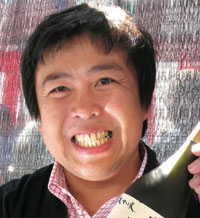Tokyo Jizake Strolling (Kanemasu Brewery, Year End Blowout Sale)
By Ryuji Takahashi
Tokyo is facing the end of this year very different from the previous year due to the coronavirus increasingly spreading and restaurants requested to shorten business hours since November. Corporations are prohibited from hosting large banquets, while restaurants close at 22:00 with half the rotations of the previous year. When that happens, sake shops are forced to face challenges due to reduced sake orders from restaurants. To overcome these challenges, we must sell sake directly to families. Therefore, Kanemasu Brewery in Niigata prefecture held a storefront blowout sale in mid-December. Kanemasu Brewery sold their specialty sake brands【Hatsuhana, Junmai Daiginjo】sold only once every few years as their featured sake products for the end of the year and the upcoming New Year.
The sake labels are old, special to consumers who know the long history of Kanemasu Brewery. The first store opened in Nagatoro, Okagata in Niigata prefecture (currently Niigata city) in 1822. The brewery relocated to Nametoko, Nigori-kawamura (currently in Niigata city) in 1883. The third generation owner is said to have relocated the warehouse to the former Shibata feudal lord Mizoguchi’s personal vegetable garden site (currently the city of Shibata)(vegetable garden refers to an herb garden). After World War II ended in 1945, the fourth generation owner foresaw expanded demand for western alcoholic beverages due to the occupying forces, acquired a whiskey distillery permit, and launched the original brand of malt, producing and selling whiskey until relinquishing the production permit in 2010.
The management structure was renewed in 2010 with classic sake brands “Blue Label” and “Red Label” consolidated as the sake brand “Hatsuhana.” Capitalizing on the regional advantage of being a “rice production region with abundant water,” the brewery joined with a local farmer and founded the Knau Company in 2017. Since then, the company started focusing their efforts growing its own brand of sake rice and brewing sake consistent with local production. Thanks to the brewery’s long history, the company’s footwork is light, posting fliers throughout the neighborhood before the year-end blowout sale.
As expected, the high-end Junmai Daiginjo aged three years sold in large quantities along with new sake brewed from new rice. I felt the outdoor dining restrictions this year are forcing people to drink at home, thus many people are seeking higher quality sake to consume at home. This year, many sake breweries closed their doors or reduced their business scale due to the coronavirus. To keep renowned breweries and their long-established history alive, I recommend readers to enjoy quality sake at home.
東京地酒散歩(金升酒造・年末販売会)
東京はコロナウイルス感染者拡大による、11月からの飲食店時短営業要請により例年とは全く違う忘年会の時期を迎えていた。企業側も大人数での宴会を禁止しているし、飲食店側も22時閉店の為、席の回転が例年の半分となっている。そうなれば、我々酒を売る側も飲食店からの注文数が減ってしまい苦しい営業を強いられてしまう。その様な状況を打破するには一般家庭にしっかり酒を売らねばならないということで、12月の中旬に新潟県金升酒造の店頭販売会を行った。この金升酒造、数年に一度しか発売されない特別な酒【初花・純米大吟醸三年氷温貯蔵酒】を年末年始の酒の目玉として発売。ラベルもオールドラベルで金升酒造の歴史を知る人には涎が出る酒である。この金升酒造の歴史は古く、文政5年、新潟県北蒲原郡岡方村長戸呂(現・新潟市)で初代が高橋酒造店を創業。明治16年に濁川村名目所(現・新潟市)に移り、大正8年、三代目が、旧新発田藩主溝口侯御菜園跡地(現・新発田市)への蔵の移転を決定したとのこと。(御菜園とは薬草園のこと。)終戦を迎えた昭和20年、進駐軍駐留を背景に洋酒の需要拡大を見込んだ四代目がウイスキー蒸留免許を取得、モルトの自社蒸留を開始、平成22年に製造免許を返上するまで、ウイスキーの製造販売していた。平成22年に経営体制を一新、以降、平成27年までに、清酒を定番銘柄「碧ラベル」「朱ラベル」と純米銘柄「初花」に統一し、“水の便よろしく米産地の中央たる”地の利を生かし、平成29年には地元農家と共同で農業法人かなうカンパニーを設立、以来、酒米の自社栽培に本格的に取り組み、地産製造の一貫した酒づくりに力を入れている。そんな歴史ある酒蔵ながら蔵元のフットワークは軽い。販売会の前に近所の住宅へチラシのポスティングを行ってくれ、それからの販売会となった。やはり、高級酒ながら三年貯蔵の純米大吟醸は多く売れ、新米の新酒も飛ぶように売れた。私が感じたのは、外食の制限がある今年は家呑みをせざるを得ない状況の為、少しでも家で良い酒を飲もうとする人が多いのではないかと。今年は、コロナウイルスのせいで廃業や事業縮小する酒蔵が多かった。少しでも酒蔵の歴史ある銘柄を残す為に、家で日本酒を皆に飲んでもらいたいと思う。
Tokyo is facing the end of this year very different from the previous year due to the coronavirus increasingly spreading and restaurants requested to shorten business hours since November. Corporations are prohibited from hosting large banquets, while restaurants close at 22:00 with half the rotations of the previous year. When that happens, sake shops are forced to face challenges due to reduced sake orders from restaurants. To overcome these challenges, we must sell sake directly to families. Therefore, Kanemasu Brewery in Niigata prefecture held a storefront blowout sale in mid-December. Kanemasu Brewery sold their specialty sake brands【Hatsuhana, Junmai Daiginjo】sold only once every few years as their featured sake products for the end of the year and the upcoming New Year.
The sake labels are old, special to consumers who know the long history of Kanemasu Brewery. The first store opened in Nagatoro, Okagata in Niigata prefecture (currently Niigata city) in 1822. The brewery relocated to Nametoko, Nigori-kawamura (currently in Niigata city) in 1883. The third generation owner is said to have relocated the warehouse to the former Shibata feudal lord Mizoguchi’s personal vegetable garden site (currently the city of Shibata)(vegetable garden refers to an herb garden). After World War II ended in 1945, the fourth generation owner foresaw expanded demand for western alcoholic beverages due to the occupying forces, acquired a whiskey distillery permit, and launched the original brand of malt, producing and selling whiskey until relinquishing the production permit in 2010.
The management structure was renewed in 2010 with classic sake brands “Blue Label” and “Red Label” consolidated as the sake brand “Hatsuhana.” Capitalizing on the regional advantage of being a “rice production region with abundant water,” the brewery joined with a local farmer and founded the Knau Company in 2017. Since then, the company started focusing their efforts growing its own brand of sake rice and brewing sake consistent with local production. Thanks to the brewery’s long history, the company’s footwork is light, posting fliers throughout the neighborhood before the year-end blowout sale.
As expected, the high-end Junmai Daiginjo aged three years sold in large quantities along with new sake brewed from new rice. I felt the outdoor dining restrictions this year are forcing people to drink at home, thus many people are seeking higher quality sake to consume at home. This year, many sake breweries closed their doors or reduced their business scale due to the coronavirus. To keep renowned breweries and their long-established history alive, I recommend readers to enjoy quality sake at home.
東京地酒散歩(金升酒造・年末販売会)
東京はコロナウイルス感染者拡大による、11月からの飲食店時短営業要請により例年とは全く違う忘年会の時期を迎えていた。企業側も大人数での宴会を禁止しているし、飲食店側も22時閉店の為、席の回転が例年の半分となっている。そうなれば、我々酒を売る側も飲食店からの注文数が減ってしまい苦しい営業を強いられてしまう。その様な状況を打破するには一般家庭にしっかり酒を売らねばならないということで、12月の中旬に新潟県金升酒造の店頭販売会を行った。この金升酒造、数年に一度しか発売されない特別な酒【初花・純米大吟醸三年氷温貯蔵酒】を年末年始の酒の目玉として発売。ラベルもオールドラベルで金升酒造の歴史を知る人には涎が出る酒である。この金升酒造の歴史は古く、文政5年、新潟県北蒲原郡岡方村長戸呂(現・新潟市)で初代が高橋酒造店を創業。明治16年に濁川村名目所(現・新潟市)に移り、大正8年、三代目が、旧新発田藩主溝口侯御菜園跡地(現・新発田市)への蔵の移転を決定したとのこと。(御菜園とは薬草園のこと。)終戦を迎えた昭和20年、進駐軍駐留を背景に洋酒の需要拡大を見込んだ四代目がウイスキー蒸留免許を取得、モルトの自社蒸留を開始、平成22年に製造免許を返上するまで、ウイスキーの製造販売していた。平成22年に経営体制を一新、以降、平成27年までに、清酒を定番銘柄「碧ラベル」「朱ラベル」と純米銘柄「初花」に統一し、“水の便よろしく米産地の中央たる”地の利を生かし、平成29年には地元農家と共同で農業法人かなうカンパニーを設立、以来、酒米の自社栽培に本格的に取り組み、地産製造の一貫した酒づくりに力を入れている。そんな歴史ある酒蔵ながら蔵元のフットワークは軽い。販売会の前に近所の住宅へチラシのポスティングを行ってくれ、それからの販売会となった。やはり、高級酒ながら三年貯蔵の純米大吟醸は多く売れ、新米の新酒も飛ぶように売れた。私が感じたのは、外食の制限がある今年は家呑みをせざるを得ない状況の為、少しでも家で良い酒を飲もうとする人が多いのではないかと。今年は、コロナウイルスのせいで廃業や事業縮小する酒蔵が多かった。少しでも酒蔵の歴史ある銘柄を残す為に、家で日本酒を皆に飲んでもらいたいと思う。






